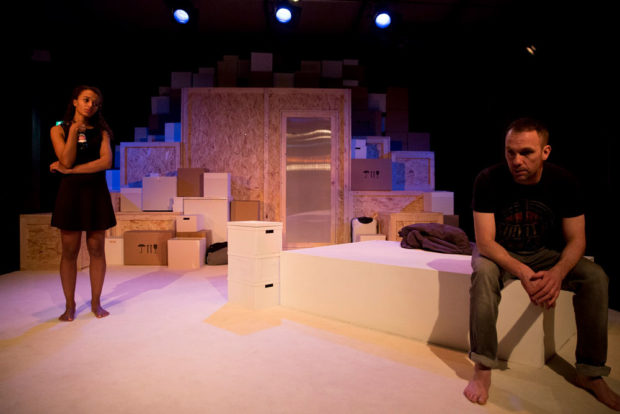You have no items in your cart. Want to get some nice things?
Go shopping
What would you do to take control?
This question, presented on Abigail‘s website, relates both directly to Joshua McTaggart’s production and to the Bunker Theatre team, whose story has been well documented over the past six months.
The Bunker Theatre is now four shows deep into its inaugural season. It’s a venue that has poked its head out of the ground unseasonably when the climate was and remains hostile to funding new arts ventures. In spite of this, the venue – run by artistic director Joshua McTaggart and producer Joel Fisher – has received a great deal of attention. The interest has swelled over the last few weeks, with numerous features written on McTaggart specifically; headlines citing the word “accidental” have been frequent. Though it would be hard to dismiss the amount of hard work that must have gone on behind the scenes, there is a narrative of luck spun about the duo.
Their programming has been varied and promising. Opening with a transfer of Isley Lynn’s Skin a Cat was a judicious choice. The critically acclaimed one-woman show demonstrated that the Bunker was a space for exciting new artists to gain further momentum and be introduced to extended audiences. Philip Ridley’s enduring Donny Stixx, directed by David Mercatali and performed by the phenomenal Sean Michael Verey, was a strong follow-up. Then Muted, though it didn’t land with critics, nevertheless showed that the Bunker was a space for risks.
Now, the inaugural season finishes with Fiona Doyle’s Abigail. The fact that it’s an in-house project perhaps makes the stakes higher, as McTaggart has taken his first stab at directing within his own venue. The occasion should be a chance to demonstrate exactly what sort of theatre the Bunker wants to represent and what excites him as a theatre-maker.
Abigail follows two nameless characters, a man in his 40s and a woman in her 20s who meet by chance at an airport on their way to Berlin. Their story is told in non-linear chunks, flitting between their promising introduction and less idyllic present. Tia Bannon is playful as Woman, but the fractured plotting proves hard work. Her character consists of sweet melodies with lingering darker notes that are hard to digest and better suited to artisanal coffee. There’s an unspecified trauma in her past; child abuse is hinted at though the details are patchy. Man (Mark Rose) meets her randomly at an airport and decides to pursue her, lured by the shape of lips. Their beginning appears innocent but, as the structure of the play has us revisiting their first encounter, it becomes tainted with melancholy.
Man and Woman’s relationship is not a happy one. She vents her rage towards her partner in increments, toying with him. Once the victim, she has transitioned into the abuser. Unresolved trauma has implications for Woman, she is altered entirely by something in the past that intrudes upon her present. Her trauma is insidious and infects what appears to be a safe partner. The casting is questionable for a two-hander that depends so much on performance to give insight to its audience: the chemistry between Bannon and Rose is unconvincing.
Doyle burdens the character of Women with numerous monologues in rapid succession that become a predictable way to illustrate her unbalanced state of mind. The bareness of the script is part of the problem; though Rose is likeable, his performance is undercooked and he does little to remedy the already sparse play. Transitions between scenes are aided by Andy Joseph’s ominous sound design, but ultimately we remain in the dark about so much of these characters’ lives. Max Dorey’s set consists of cardboard boxes that are piled high against the back wall. On occasion, the actors hike upwards, searching for new heights and dimensions to their lives that they’re unlikely to find. The inclusion of a shower seems lavish, along with a final lighting trick with the boxes that closes the show. It feels as though there are fundamental things missing in Abigail that these light touches can do little to mask.
I found myself thinking, of all things, about the cult CITV children’s TV programme Art Attack – specifically the Big Art Attack hosted by Neil Buchanan. He would create gigantic pieces of art out of everyday objects and the sequence would be played in double time with the camera panning out right at the end to reveal the creation. Watching Abigail felt a bit like watching Art Attack if the TV had suddenly turned off halfway through. Doyle’s script sketches out two characters that McTaggart tries to give shape to, but we never actually have a firm understanding of either of their contours. The intention to create mosaic-like theatre is undermined by the lack of depth and detail in the first instance. The final image resembles something familiar but the familiarity is drawn from what art this piece reminds us of, rather than being artful itself.
While I think the Bunker can be a space of experimentation and new writing, it’s a shame when the artistic director’s creation in this instance is so lightly sketched. It makes us wonder: what is to come for this space?
The question of control is left unanswered in Abigail, and, perhaps, has yet to be answered by the Bunker Theatre.
Abigail continues until February 4th at the Bunker Theatre. Tickets are available for £19.50 (£15 concessions); there are also £10 tickets available for under-25s.

About Rebecca Latham
Graduating from Sydney University in 2012, Rebecca moved back to England to pursue a career in Theatre. She has most recently been Project Administrator on The Old Vic 12 and in the past has worked with Raindance Film Festival and Arcola Theatre. She has been writing reviews for A Younger Theatre since 2013 and is interested in Theatre, Film and Literature.




